
THE VOICE OF INTERNATIONAL LITHUANIA
|
VilNews has its own Google archive! Type a word in the above search box to find any article.
You can also follow us on Facebook. We have two different pages. Click to open and join.
|
Lithuania in the world
- Posted by - (1) Comment
America's important
role for Lithuania

The ‘Lithuanian’ senator, Richard ‘Dick’ Durbin (67) with President Barack Obama.
Durbin is the senior United States Senator from Illinois and the Senate Majority Whip, the second highest position in the Democratic Party leadership in the Senate. Durbin was born in Illinois to an Irish-American father, William Durbin, and a Lithuanian-born mother, Ann Kutkin (Lithuanian: Ona Kutkaitė). Durbin has over many years done a truly great job not only for America but also for his motherland, Lithuania!
Text: Aage Myhre, Editor-in-Chief
aage.myhre@VilNews.com
During a visit to the U.S. some years ago I spoke with immigrants from various countries who now live in the United States. All with one thing in common; that they had abandoned their homelands. I met exiled Cubans. I saw Iranians who fled to USA after their Shah, Mohammad Reza Shah Pahlavi, was overthrown from the Persian Peacock Throne in 1979. I talked to many Eastern Europeans who escaped Stalin's atrocities during and after World War II. I talked to Jews who were born in the U.S., but still feeling and having very close ties to Israel.
It strikes me that the U.S. has done much more for exiled nationalities than what our Western European nations have done.
It was probably not without reason that the majority of Eastern Europeans who managed to flee westwards towards the end of World War II preferred the U.S. over Western Europe. For in truth our Western European support to our eastern brothers and sisters was rather half-hearted during the post-war years.
|
The incredibly bloody partisan war that the Balts fought against the Soviet occupiers in the years 1944-1953 was barely mentioned in Western Europe. The fact that over 100 000 people were killed, tortured and assassinated right outside our own doorsteps got shamefully little attention. Information on the countries' own language played an invaluable role. Radio signals reached behind the Iron Curtain... |
|
|
|
|
"Chicago is Lithuania's second largest city," said the young man smilingly when he welcomed me to the LWC, the Lithuanian World Center in Lemont in the outskirts of Chicago. It is an impressive centre, with a church and much more which this 'nation outside of the nation' has built. It was here from Chicago that the struggle against the Soviet occupation of the Baltic states continued nonstop from World War II until liberation finally came in 1990-1991. I hear statements like; ‘those who fled to the United States were living the good life, while those who weren’t that lucky were subjected to deportations and atrocities of the Soviet power’. What I also see is that Lithuania's leaders only very hesitantly want their countrymen and women welcomed home after the 50 painful years of cold war between east and west. Lithuania is about to lose a tremendous opportunity. But all hope is not lost. |
|
- Bookmark :
- Digg
- del.icio.us
- Stumbleupon
- Redit it
Six post-war giants
- Posted by - (0) Comment
Over the past 20 years I have got acquainted with many Lithuanian-Americans. There are numerous I could have mentioned, but let me at least concentrate on six fine individuals who have made a truly great contribution to their home country. All six are Lithuanian-Americans who have contributed substantially from their land-volatile positions during the post-war years, and over the last 20 years also from inside Lithuania.
One of them was even president for two periods, H.E. President Valdas Adamkus. When I met him at his presidential office in Vilnius in 2005, he concluded the meeting by saying: "I have been fighting continuously for my country, both during and after World War II, from exile and on Lithuanian soil. Yet, after all these years, I must admit that I feel like an outsider in my own country."
Sad words, but unfortunately indicative of how the Lithuanian-Americans often are received when they return home to Lithuania.
Six prominent giants who fought for their
homeland from exile positions in the U.S.
|
|
|
|
|
|
|
|
- Bookmark :
- Digg
- del.icio.us
- Stumbleupon
- Redit it
- Posted by - (2) Comment
NOW IN CHICAGO!
National Lithuanian
American Hall of Fame
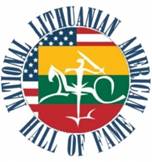
Bringing attention to Lithuania’s epic history and the global contributions of its people today in the arts, sciences, sports, politics, and economics.
Football greats Dick Butkus and Johnny Unitas, film director Robert Zemeckis, screen stars Charles Bronson, Ann Jillian, and Ruta Lee, musicians Benny Goodman and Bob Dylan, author J.D. Salinger, and Senator Dick Durbin are but a few famous individuals with roots in a nation that was once the largest and amongst the most powerful in Europe, Lithuania. Their achievements will now be commemorated by The National Lithuanian-American Hall of Fame (NLAHF).
Lithuanians and their history have been living in relative anonymity among the American public, as Lithuania’s voice on the world stage was silenced during a half-century of Soviet Occupation. With independence restored, Lithuania has reasserted its place in the advancement of world culture – a feat recognized by the designation of its capital, Vilnius, as the “Cultural Capital of Europe” in 2009.
With a governing Board composed of members from various ethnic and racial communities, the National Lithuanian American Hall of Fame is a non profit organization with a primary objective of acquainting the American public with Lithuanians, their epic history and unique culture. The NLAHF now takes this opportunity to publicize Lithuania’s history and its people’s global contributions in the arts, sciences, sports, politics, and economics.
The National Lithuanian American Hall of Fame’s “Achieving Relevance” campaign includes educational initiatives in American and Lithuanian communities. For more information on how you can support these worthwhile efforts, contact Jon Platakis at: jon@lithhof.org .
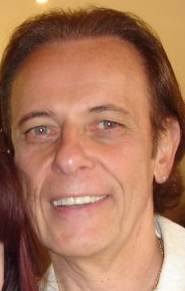
Jon Platakis.
NLAHF has also it own Facebook page:
http://www.facebook.com/pages/National-Lithuanian-American-Hall-of-Fame/141366249270713
- Bookmark :
- Digg
- del.icio.us
- Stumbleupon
- Redit it
- Posted by - (3) Comment
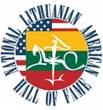
Was Columbus
a Lithuanian prince?
|
SON? |
FATHER? |
Historian unmasks Columbus’ true identity.
Will Lithuanians be able to add another page to their already epic history? Will the National Lithuanian American Hall of Fame (NLAHF) have yet one more candidate for induction? Daine Jablonskyte-Marquez and Jon Platakis, members of the NLAHF, tracked down historian Manuel Rosa at his job at Duke University, to enlighten us on his 20 plus years of research into the identity of Christopher Columbus.
Confidently, and with primary source documents to verify his assertions, Rosa states, “Columbus was a royal prince, son of a Portuguese noble lady and exiled King Wladyslaw III (a direct descendent of one of Europe’s greatest ruling dynasties, Lithuania’s Gedeminian dynasty). He was hiding his identity from the public at large but the courts of Europe knew who he was.” Pointing to documentation in his new book, COLON. La Historia Nunca Contada (COLUMBUS. The Untold Story) recently published in Spain, and to be published May 2012 in Poland, that Columbus’ marriage in 1479 to a Portuguese noblewoman, who was a member of the Portuguese military order of Santiago, required the approval of the King of Portugal, a procedure reserved only for someone of major importance. “This new Portuguese document alone,” stated Rosa, “makes the entirety of Columbus’ Italian history false.” Rosa’s evidence appears irrefutable that Columbus, who had been housed in the palaces of the nobility, had access to royal courts, and married into nobility, could not be, as our history books tell us, the son of a poor weaver from Genoa.
So, who was Christopher Columbus, if not a poor weaver’s son from Genoa? Rosa believes that his true identity was Prince Segismundo Henriques which was concealed in order to protect his father. All of Rosa’s evidence points to Wladyslaw III, king of Poland and Lithuania as being the father of Christopher Columbus. Rosa suggests that there is proof the king survived the Battle of Varna in 1444 against the Ottomans and lived in exile on the island of Madeira under the name of “Henrique the German,” married to a Portuguese noblewoman.
Is this just another nutty conspiracy theory? Not according to leading historians based at the University of Lisbon, and St. Joseph’s University. Rosa utilized medieval documents and chronicles from multiple kingdoms to cross-reference historical events and personalities, plus ancient genealogy and heraldry. In addition, Rosa’s mastery of Spanish, Italian, and Portuguese, allowed him a more accurate interpretation of these primary source documents.
Members of the National Lithuanian American Hall of Fame, lament the fact that there seems to be little interest from American, and our own Lithuanian historians and researchers, to either accept or contradict Rosa’s findings. According to Rosa, he has not yet had any success in finding a U.S. publisher for this history altering book.
It appears a certainty that Christopher Columbus was not the poor weaver’s son from Genoa. However, in the near future, it is hoped that Polish authorities will open the tomb of King Wladyslaw II, (Jogaila) the Lithuanian King of Poland, to obtain DNA evidence to prove that Christopher Columbus is a son of Lithuania who hid his royal lineage to protect the secret that his father had survived the Battle of Varna.
- Bookmark :
- Digg
- del.icio.us
- Stumbleupon
- Redit it
Is there a new role for Lithuanian-Americans?
- Posted by - (5) Comment

Members of 'The Lithuanian-American Community
protest outside the Capitol in Washington in 1990, against
Soviet President Gorbachev's policy regarding the
Baltic States. They played a real role by then.
Is there still a role for them to play?
Photo: UPI, Joe Mahoney.
Lithuanian Americans have always found themselves as defenders of the ideas and ideals of both Lithuania and their adopted country, the United States. During the years of Soviet occupation, Lithuanian Americans played a key role in keeping hope alive. Without the actions of Lithuanian Americans, there would not have been a non-recognition policy, and without the hard work of so many Lithuanian Americans past and present that policy would not have served as the beacon of hope it was for Lithuanians in Lithuania.
Not surprisingly, many Lithuanian Americans concluded at the time of the end of Soviet occupation that their job was completed. After all, what they had done for more than 50 years was little short of heroic. And there was the additional and for some extremely painful fact that many in Lithuania itself felt that the diaspora had made its contribution but that Lithuanian-Lithuanians must now take the lead in the future development of their country.
As a result, many Lithuanian Americans have ended or at least reduced their participation in public life. Now, this withdrawal from public life threatens to become a stampede. Lithuania has become a member of NATO, a step that many have seen as the final guarantee of its independence and security. And Lithuania has joined the European Union, another step toward the reintegration of Lithuania into the European world from which it was so brutally wrenched by the Soviet government in 1940.
But these events should not be the “end of history”, there are many serious challenges ahead both for Lithuania and for Lithuanian Americans, all of us who care about Lithuania may have to work harder than we ever did in the past.
The Soviet occupation of the Baltic countries continues to cast a shadow on the political calculations in Moscow and in the minds of many Lithuanians, and because this is so, Lithuanian Americans have a special role to play in dispelling both these shadows.
I don’t think it is an exaggeration to say that had there not been a Lithuanian diaspora, the Soviet government might have survived far longer than it did. Now, it is imperative that Lithuanian Americans again play the key role in making sure that Lithuania will not suffer because of such actions. And that includes not only telling the West but making sure that people in Lithuania understand what is at stake as well.
Lithuanian Americans have played a key role in fighting the hangover of the communist past, and we can all be proud of the role that Lithuanian Americans have played. I believe that Lithuanian Americans can make a significant contribution also to the future. But we need to recognize that the threats to that future are real and that Lithuanian Americans need to act as they have in the past.
Egle Dudenas
Egle Dudenas wrote this article in 2005, but her points are as good today as they were by then. VilNews is hereby inviting our readers to comment on this important topic.
- Bookmark :
- Digg
- del.icio.us
- Stumbleupon
- Redit it
The Lithuanian Picnic
- Posted by - (3) Comment
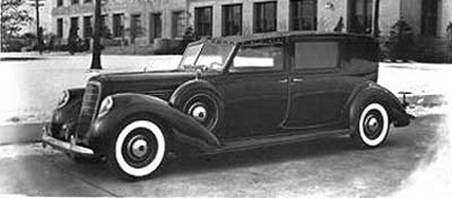
Straight-line 12-cylinder 1938 Lincoln Saloon
By KR Slade
Sunday was, as usual, the day for Father and me to go to Lithuanian Catholic mass; and, as usual, thereafter, to return to my familiar English-speaking world. Our Sunday masses were always at our Lithuanian church -- the only one between Massachusetts and Connecticut. I never had any idea what anyone at church was saying, because I did not understand any Lithuanian. In 1958, the mass was in Latin; however, the sermon, readings, singing, and announcements were in Lithuanian. I understood some Latin, although I was only ten years old. It was the ‘everything else’ -- before, during, and after church -- that I did not understand . . .
After mass, there was our weekly tradition: a couple of ‘dogs’ at the ‘New York System’ wiener-joint, just around the corner from the church, in the old inner-city Lithuanian neighbourhood; then a drive across town to the Italian bakery for a box of pastries to take to Mother’s parents’ house for an hour or two of ‘Sunday visit’.
It was not until we were at home that Father announced the news: next Saturday was to be the first-of-the-summer-season Lithuanian picnic. Mother’s reaction was that this was going to be a lot of work for her: to prepare all of the food, for the three of us and more to share. I thought that it would be great: lot’s of other kids, to meet and play with, none of whom spoke anything but English. We all would ‘goof’ on all of the adults trying to speak Lithuanian, which the adults did not know very well, had forgotten, would be corrected, and would argue about. They would be so language pre-occupied as to leave us kids alone, for us to have our fun . . .
Next Saturday, Father’s old -- but still impressive, straight-line 12-cylinder 1938 Lincoln Saloon’s huge trunk compartment was picnic-packed. We rolled out of our driveway.
“Tom. There will be swimming, of course. Did you bring your swimming trunks?”
“Yes.”
(Mother): “Well, I hope that it’s going to be at the big lake, the water is good there. That other picnic place -- with the big pond is okay; but that other picnic place, with the little pond -- I don’t want Tom swimming there. I think that there are leeches there. So, which picnic ground is it ?”
That’s when Father stepped on the brakes, more notable an event because we were going up a hill.
“Ohh . . . ”
“Which picnic ground is it ?”
“Ohh . . . ”
“Which picnic ground is it ?”
“Well, . . . ”
“Don’t tell me that you don’t know.”
“Okay.”
“Which picnic ground is it ?”
“We’ve been there.”
“Which picnic ground is it ?”
“It’s not a problem. We will see. Everything will be okay. We will just go to the church.”
“It is eleven o’clock. The picnic is at noon. It is an hour’s drive to any of the three picnic grounds. The church is a half-hour away; the other way.”
“It’s OK; we will go to the church; and we will see.”
“What we will see is nothing; because everyone will have already left.”
“Well, we will go to the church, and we will see.”
We went to the church . . . ‘to see’ . . . and we saw nothing. Any idea of posting a notice as to where/what/when or anything about the event, was an unknown concept [both then and thereafter, and probably in the hereafter and forever]. No need to tell: ‘Everyone knows’.
We drove around the neighbourhood of the church. Father reasoned that there would be someone knowledgeable of the precise details of the event, although unable/unwilling to attend. Of course, since we were passing the New York System Wieners, we were obliged to stop for ‘a couple of dogs’, on the pretence of getting information. Mother waited in the Lincoln, with the doors locked and windows rolled-up. Somehow, she noticed the tiniest touch of mustard, and made me take-off my T-shirt.
We drove around the neighbourhood, looking for addresses. After knocking on six doors, he did find one person who knew the correct location. Now we knew which picnic ground: the one with the big lake.
From my spacious backseat of the Lincoln, a limousine-distance away from the front seat, I could see my father chain-smoking, and it seemed like smoke was coming from my Mother’s ears. However, the Lincoln leather seat soon became uncomfortably hot on my bare back, so I took to sitting on the thick-wool rugged spacious floor. Father kept a very clean car. The long drive encouraged me to change positions frequently. Positioning my feet on the back of Father’s seat was not such a good idea, because at a traffic light stop, his huge bear paw of a hand reached over and behind and caught me on my right calf, which encouraged me to find other positions. That was when I understood what was going to be the mood of this family outing.
We arrived at two o’clock: two hours late. However, there was no one there. Father praised the solitude of the lakeside forest; Mother was silent -- still-more smoke from ears, still makes no sound, but makes for a more profound stillness. We ate our picnic, in Silence.
We had too-much food. Mother was not particularly hungry. Father had a seemingly larger than his large-normal appetite. I was a tall, but skinny, kid; I never ate much; and Father kept urging me to eat more. However, after the over-eating, there was still too-much food.
A couple of other picnicking families arrived, around the lake. Father gathered up the excess food, and he and I carried it off on a give-away mission. The first family was Polish; Father spoke with them for a long time in their language; they had plenty of food and did not want any more; they gave us some great homemade pickles; Mother was not pleased that we returned with more food. The second family was Jewish, and kosher; so, it was not opportune to offer our pork-laden gifts; but Father had a long talk with them in Yiddish and Russian, and they gave us some nice sweet bread. Mother was more displeased with the more food. Father and I set-off on a walk around the lake, where we ‘lost’ our gift-food. For the resident squirrels and other creatures, it must have been a day of bonanza.
I mentioned swimming. Mother said that I could not swim alone. Father said he would swim with me. Then he remembered that he had forgotten his swimming trunks. My parents had a short discussion.
“It’s okay. I will swim in my underwear.”
“No; you will not.”
It was time to leave. We packed our residue picnic paraphernalia into the trunk of the Lincoln.
Three busses of Lithuanians arrived, from our church. Evidently, the picnic was to be at 3:30 pm.
Everyone was very cordial, but there were the inevitable questions, totally understandable, directed to my mother.
“Why did you not wait to eat with us ?”
“Why did you not bring food to share with others ?”
“You did not cook ?”
In very-good Lithuanian, Mother responded to the Lithuanian-language questions, saying, “I do not speak Lithuanian-language”.
Unfortunately, the bus ride had been long, and this early-summer day was very hot. The Lithuanian taste for milk-products was not suitable to this especially hot summer day. Personally, I do not like beets, especially in soup, more-especially with cream. Mother continued her day’s fasting; I did not want to eat more; even Father had over-eaten.
And it came to pass, that the three busloads of Lithuanians became ill; violently ill -- with some sort of great stomach distress. Father drove to find a telephone to call a hospital. Three ambulances arrived. The one doctor examined people.
One of the ambulance drivers was German, and was somewhat naturally attracted to the ‘borscht’ soup -- with the cream, on the sunny picnic-buffet. His workday ended, and his ambulance was soon to become abandoned. It was strange to see the doctor driving one of the three buses -- all to the hospital.
We drove home in the Lincoln. Mother said nothing. Actually, she said nothing for about a week, which was the same amount of time that Father slept in the guest room. Maybe it would not have been so bad if on our way home Father had not said, “As I told you, everything will be okay; we will see.”
I had a great time at the picnic; well, at least before everyone else ate, and before I experienced ‘sympathetic vomiting’. There were lots of other kids to play with; and there was good swimming. I met a cute Lithuanian girl, although she was two years older. I told all of the kids the story of how we came to our Lithuanian picnic; they all laughed. She told me, “You tell good stories.” I became more interested in going to Sunday mass. Five years later, she was my date at my Freshman Prom.
“Everything will be okay; we will see.”
The foregoing article is ‘fiction’, an excerpt from “T.F.”. Then again, maybe it is a ‘fiction’ to say that it was ‘fiction’; you can never know with ‘fiction’ . . .
All Rights Reserved: 2006
Note: A version of the foregoing story was published in the October--November 2006 issue of the Canadian subscriber's journal, 'Dialogue' magazine (www.dialogue.ca)
- Bookmark :
- Digg
- del.icio.us
- Stumbleupon
- Redit it
- Posted by - (5) Comment
Lithuanian footprints
|
|
|
|
Bona Sforza (1494-1557), Grand Duchess of Lithuania, Queen of Poland, Duchess of Bari and Princess of Rossano, left the Royal Palace in Vilnius after her husband Grand Duke Sigismund the Old died in 1548. She stayed eight years in Poland and then went to Bari in Southern Italy to claim a sizeable dept from King Philip II of Spain. But instead she was poisoned by her trusted officer, Gian Lorenzo Pappacoda, acting on behalf of King Philip. She was buried in St. Nicholas' Basilica in Bari, where her daughter Anna had a beautiful tomb made in the current Renaissance style for her remains (above, left).
See also: https://vilnews.com/?p=1652
CAPE TOWN, SOUTH AFRICA
|
|
|
Dr. Mendel Kaplan (1936-2009), steel magnate, writer and philanthropist, whose family emigrated from the town Rietavas (near Klaipeda) in the 1920s was called "the father of the South African Jewish community," also very much involved in the establishment of the South African Jewish Museum in Cape Town, a museum that appears more Lithuanian than Lithuania itself. Walking through the museum's cellar floor is like walking through Rietavas in year 1900.
Read more at: https://vilnews.com/?p=1703
DELHI, INDIA
|
|
|
Professor Lokesh Chandra (84), one of India's leading experts on Sanskrit and Buddhism, tells me this early morning in his New Delhi office: "The very mention of Lithuanian opens up an image, a vision that gives a people their identity through language. It shows how the darkness of dreams becomes the new embodied hope. My father was stimulated and strengthened in his work on the development of Hindi by the history of Lithuanian language. It has been the eternal continuity of these people; - it rustles something deep in their being. My father felt that we in India share with our distant Lithuanian brothers the silent geography of lost frontiers. Political freedom is inseparable from language."
And the professor continues his amazing story: "My father would relate how grandmas in the remote villages narrated folk-tales to eager grandchildren in their Lithuanian language which was despised by the Slavised nobility and punished by the Czarist regime. My father also told me how the Lithuanian daina (songs) were abandoned by the courts, but still continued to live on in the villages, faithfully preserved by the poorest people of Lithuania, guarded by the mothers of the families even during the darkest periods of Lithuania's history."
"Such was my first contact with Lithuania, in 1937, at an age of ten," smiles Professor Chandra this early Delhi morning.
Read more at: https://vilnews.com/?cat=18&paged=2
BOGOTÁ, COLOMBIA
|
|
|
Antanas Mockus (his full name is Aurelijus Rutenis Antanas Mockus Šivickas) was born 25 March 1952 in Bogotá, Colombia. His parents were Lithuanian immigrants. He is a mathematician, philosopher, and politician. He was mayor of Colombia's capital, Bogotá (population more than 7 millions), for two terms, during which he became known for springing surprising and humorous initiatives upon the city's inhabitants. These tended to involve grand gestures, including local artists or personal appearances by the mayor himself — taking a shower in a commercial about conserving water, or walking the streets dressed in spandex and a cape as Supercitizen. The impact of Mockus on the development of Bogotá is described in a documentary film released in October 2009 with the title CITIES ON SPEED - Bogotá Change.
ARCTIC & SPACE
|
|
|
Mikalojus Konstantinas Čiurlionis (1875-1911), Lithuania's national painter and composer, has a mountain and an asteroid named after himself. In 1913 on an expedition through the Arctic ocean a painter N.Pinegin turned his attention to a plateau in the Franz Josef Land archipelago, which resembled M.K.Ciurlionis' painting "Stillness" (above). So he called it the Ciurlionis Mountain. In1975 the Crimean astrophysicist Nikolaj Cernych discovered a new 8 km diameter asteroid and called it the Ciurlionis asteroid. It orbits round the Sun in approximately four years (average distance from the Sun: 384 mln. km).
LITVAKS (LITHUANIAN JEWS) IN ISRAEL AND THE U.S.
|
|
|
|
Benjamin Netanyahu, Jon Stewart and Bernanke – prominent world Litvaks. Jews of Lithuanian origin are today in leading roles and positions around all the world – some of our nowadays most famous politicians, scientists, businessmen, economists, actors, writers and singers...
Read more at: https://vilnews.com/?page_id=152
FBI – WASHINGTON, USA
|
|
|
Alexander Bruce Bielaski (1883-1964) was born in Montgomery County, Maryland by Lithuanian emigrant parents. He received a law degree from George Washington University in 1904 and joined the Department of Justice that same year. Like his predecessor Mr. Finch, Mr. Bielaski worked his way up through the department. He served as a special examiner in Oklahoma where he "straightened out the court records" and aided in the reorganization of Oklahoma's court system when the Oklahoma territory became a state. Returning to Washington, Mr. Bielaski entered the Bureau of Investigation and rose to become Mr. Finch's assistant. In this position he was in charge of administrative matters for the Bureau.
At the end of April 1912, Attorney General Wickersham appointed Mr. Bielaski to replace Mr. Finch. As chief, Mr. Bielaski oversaw a steady increase in the resources and responsibilities assigned to the Bureau.
After leaving the Bureau in 1919, Mr. Bielaski entered private law practice. According to The New York Times, while on a trip to Cuernavaca, Mexico in 1921, Mr. Bielaski was kidnapped. He escaped three days later, saving himself and the $10,000 gathered to rescue him.
Mr. Bielaski worked undercover as a prohibition agent operating a decoy speakeasy in New York City. From 1929 to 1959, he headed the National Board of Fire Underwriters team of arson investigators. In 1938, Mr. Bielaski served as president of the Society of Former Special Agents. He died in February 1964, at the age of 80.
- Bookmark :
- Digg
- del.icio.us
- Stumbleupon
- Redit it
- Posted by - (4) Comment

A new campaign is born! The campaign is called ‘Invite Your Friend to Lithuania’, already receiving good support from service businesses all over the country and abroad. Those who invite friends to Lithuania can even win free flights to Vilnius, Kaunas or Palanga, visit various events free of charge, get souvenirs and receive discounts different places.
People are invited to join the initiative at www.invite2lithuania.com or at the initiative’s Facebook Page where we all are encouraged to invite our friends and acquaintances to Lithuania.
The campaign seeks to invite a record number of people to visit Lithuania in 2011-2012 through Lithuanians and friends of Lithuania all around the world. The Campaign is organized by ‘Global Lithuanian Leaders’ (GLL) - a network that unites talented professionals and leaders who associate themselves with Lithuania and contribute to the continued economic, political, social and cultural transformations currently underway in Lithuania.
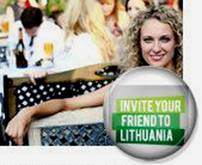
Dalia Venslovaitė
Dalia Venslovaitė, Director at GLL tells that ‘This year Lithuania has already welcomed a record number of visitors. Our goal is that people who have already visited and enjoyed Lithuania would invite others through their social networks. Moreover, we focus much on Lithuanians living abroad. They are our best ambassadors in revealing why it is worthwhile visiting Lithuania‘.
According to the Lithuanian State Department of Tourism under the Ministry of Economy, during the first quarter of 2011 there was a 39.4 % increase in tourism in Lithuania comparing to the previous year. During the latest quarter Lithuania has welcomed 150 000 tourists while the total number of tourists last year was 107 000. One tourist spends around 1.040 LTL daily. Last year an average stay of one tourist in Lithuania was 4.3 nights. Hence, one tourist alone brings around 600 LTL directly into the state budget.
- Bookmark :
- Digg
- del.icio.us
- Stumbleupon
- Redit it

PHOTO: http://www.migracija.lt
On 1 January 20111, the population of the EU27 was estimated at 502.5 million, compared with 501.1 million on 1 January 2010. The population of the EU27 grew by 1.4 million in 2010, an annual rate of +2.7 per 1000 inhabitants, due to a natural increase of 0.5 million (+1.0‰) and net migration of 0.9 million (+1.7‰).
These figures come from a report published by Eurostat, the statistical office of the European Union.
In 2010, over 60% of the increase in the EU27 population came from migration. In relative terms, Luxembourg (+15.1‰), Malta (+5.4‰), Sweden (+5.3‰).
Italy (+5.2‰) and Belgium (+5.1‰) had the largest net inflows.
Lithuania (-23.7‰) and Ireland (-7.5‰) recorded the highest net outflows.
Crude rates of population change (per 1000 population)
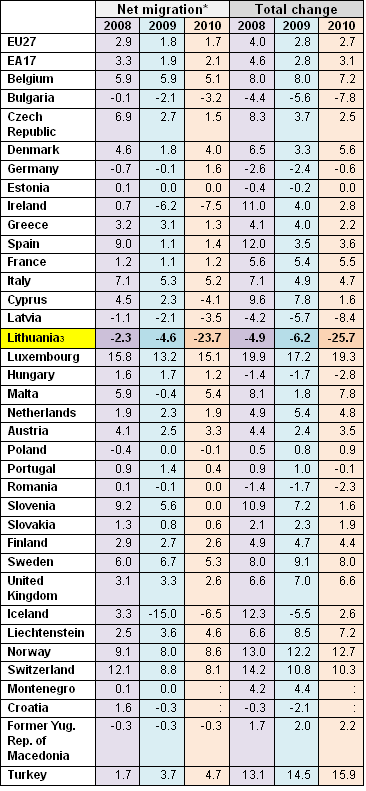
* Including the statistical adjustment that corresponds to all changes in the population that cannot be classified as births, deaths, immigration or emigration.
3. Due to administrative reasons, the relatively high net migration in Lithuania in 2010 may include emigration that took place over previous years.
Eurostat news releases on the Internet: http://ec.europa.eu/eurostat
- Bookmark :
- Digg
- del.icio.us
- Stumbleupon
- Redit it
- Posted by - (0) Comment
WORLD LITHUANIAN ECONOMIC FORUM
VILNIUS, 4-5 JULY:

A successful event, but
will it create any ripple effects?
The World Lithuanian Economic Forum (WLEF) is still in full swing as I write this. So I should be careful about drawing too many conclusions yet. What I have seen so far, is an event where some 400 people meet to discuss what more can be done to collect Lithuanians from all over the world to joint efforts for their fatherland. More investments, more engagement is being requested. The mood is good, the speeches and discussions as well. Yet I can not help but wonder why only about 100 of the 400 attendees are foreign-Lithuanians. Nearly half of all who call themselves Lithuanians live, after all, far from their country of origin, and they should constitute a very significant resource for further development of this nation.
It was also remarkably few business people represented, as a percentage of the number of participants, hence the business-to-business impact can hardly have been very large.
Yet it is my conviction that this is an event that has a future, and I hope to see WLEF in Vilnius also next summer.
These are mythree suggestionson how tofurtherdevelop and enhance the event:
1. MORE BUSINESS-TO-BUSINESS
The president, government, organizations and businesses should work together to make WLEF even more business-oriented, to invite and prepare for specific interaction activities between local and international companies. Local organizations and their sister organizations in other countries, like Rotary Clubs, should be integral parts of the event, planning well in advance for face-to-face meetings at the event.
2. A PERMANENT, YEAR-ROUND OPERATION
ICC, together with other organizations, should establish a permanent secretariat, with state support, for a year-round operation of the kind of activities that should appear in each year's WLEF summer event.
3. AN EVEN BROADER FORUM – FIRST WEEK OF JULY EVERY YEAR
The WLEF forum should become an annual tradition, going on for a whole week every summer, for example during the first week of July in connection with the celebration of King Mindaugas coronation on 6 July. The event should include several types of activities; within business, culture, festive gatherings, etc. I think this would make more foreign-Lithuanians and their families come to participate. The weaving of contacts would also be improved by more social interaction, and the many who live outside the home land will increasingly feel that they are appreciated and welcomed home!
Aage Myhre, Editor-in-Chief
|
THE OPENING SPEAKERS |
|
|
|
|
|
THE KEY-NOTE SPEAKERS |
|
|
|
|
|
THE ROUND TABLE PANEL DEBATERS |
||
|
|
|
|
|
|
|
|
The round-table debaters had some good points in yesterday's WLEF meeting. The question they all would answer, was what they thought should be done to make Lithuania more progressive and competitive in the future.
EDUCATION, EDUCATION, EDUCATION
"Education, education, education" was David Passig's formula, with reference to statistics showing that there is a clear correlation between education level and economic growth in a country.
Education Minister Steponavicius noted dryly that there still are too many students who are more concerned with getting a diploma than to acquire acquire real knowledge, concluding that the quality level of higher education in Lithuania must be raised. "20 years have given us the time we need to find our place in the context of 'global Lithuania. Now it is high time that we have developed an education reform that works," the Minister stated.
MINISTRY OF TALENT – BRAIN CIRCULATION
Omnitel's President Antanas Zabulis, suggested that the Ministry of Education should perhaps change its name to 'Ministry of Talent' and also mentioned that Lithuania no longer should focus neither on brain drain nor on
brain gain, but on brain circulation.
By virtue of his position he also noted that broadband and other internet Internet solutions are highly essential for a good development of Lithuania. "It is no longer enough to have good ideas, speed is now just as important," he said.
ISM's President, Nerijus Pačėsa, meant that more private universities (as ISM is) would raise the education standard in this country, referring to the fact that the highest graded universities in the U.S. and Japan all are private.
"Also, Lithuania should adopt financing of education through loans, as in Western countries, not leave it all state-financed as is today's situation," he added.
IMPROVED COLLABORATION GOVERNMENT – BUSINESS
Economy Minister Žylius expressed eagerness to improve opportunities for collaboration between government and business. He also said that the
financial tools one now has access to through EU funds, etc. should be applied to the development of mechanisms that promote future developments within the fields of technology, industry, FDIs, etc.
"The government should not tell business what the future will look like, but be a predictable, good facilitator for the business community to see and discover future opportunities," said the Minister.
LET'S BUILD THE BALTIC STATES' LARGEST CONFERENCE CENTRE
Air Baltic's chief in Lithuania, Tadas Vizgirda, referred to some rather gloomy
statistics about tourist traffic into Lithuania. The sad fact is that Latvia has around 5 million visitors per year, while Lithuania, a country with 50% more
inhabitants, is visited by just 1.5 million annually." An enormous potential
that our tourist authorities should no longer ignore, especially considering that every tourist will leave around LTL 600 in tax money," he said, adding that Lithuania would be able to obtain a solid position for professional
travelers if there was invested in building the Baltic States' largest conference centre right here over the next few years.
THE EVENING MUSIC
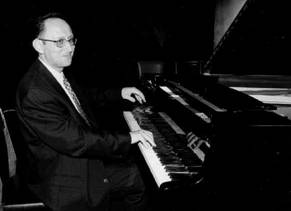
Zecharia Plavin,
a famous Israeli pianist, born in Lithuania, entertained the WLEF delegates
with superb interpetations of Ciurlionis, Liszt and Ravel.
|
THE ORGANISERS |
||
|
|
|
|
ICC Lietuva is organizing the World
Lithuanian Economic Forum (WLEF)
The goal of the World Lithuanian Economic Forum is to draw Lithuanian business people, economists, politicians and scientists from the entire world into Lithuania's economic life, to strengthen their relations with Lithuania, to encourage them to develop business here, to help attract investments to Lithuanian companies and to create a global network of Lithuanians from all the world.
The Forum is organized by the Lithuanian Business Confederation | ICC Lithuania in cooperation with governmental institutions as well as business companies.
The organizers are doing a great job that they deserve very much honour for!
- Bookmark :
- Digg
- del.icio.us
- Stumbleupon
- Redit it
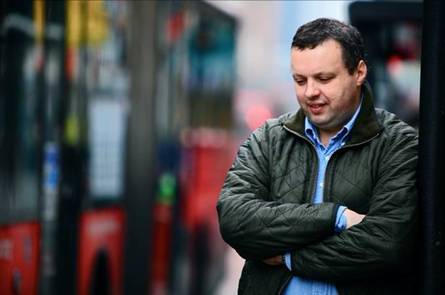
My name is Andrius Užkalnis, I am 40 and later this month I am coming back to Lithuania after a long time in England.
Photo: Otto Kylmala.
By best-selling writer Andrius Užkalnis
In three weeks‘ time, I will become a resident of Vilnius – again, after almost 17 years.
I was asked to write this for VilNews – where not many people know me. My name is Andrius Užkalnis, I am 40 and later this month I am coming back to Lithuania after a long time in England.
I moved to UK as a very young man, back in 1995, to work for the BBC, where I spent over 16 years – initially as a linguist and then as a manager, working in various parts of the world.
A few years ago I started writing – first for various magazines, both glossy and intellectual, then for national newspapers, then I published a few books and they were not entirely unsuccessful. Actually, all three went to be multiple-print-run bestsellers, one of them got translated into Latvian and published there too, so I suppose this counts as being an author of international acclaim, sort of.
I did bits of work for the Lithuanian national radio, commenting on various things British and international, and about a couple of years ago, a decision started to crystallize that it would be a good idea to go back.
Why? Because I can, because I can afford to, and because I felt I could do more in Lithuania, achieve more, be recognized and also enjoy a better living standard for my family and myself. In Vilnius, we can afford to live centrally – very centrally. In a house built in 17th century, in the very heart of Senamiestis, the Old Town, so that the closest patch of greenery would be Šventaragio slėnis, right behind the Cathedral, where they buried dukes and kings. The gothic marvel of St Ann’s will be my closest church. My girl’s school will be three minutes away, overseeing the ancient church spires and monasteries in a picture-perfect postcard view out of their classroom windows.
This would be an equivalent of living across the road from St James’ Park in London. I could never afford to have it in England. It would not be a realistic prospect. In Reading, Berkshire, where I live, there are people boarding a train to Paddington every morning, with Savile Row suits, going to their £200,000 jobs in London. They are easily in the top 2% of the population, income-wise, and they still have to commute to work.
My wife, Lina, is Lithuanian too, she is a linguist specializing in legal documentation and has her own practice and can work from wherever she wishes. More importantly, she also wants to live in the Old Town. She was born in Vilnius (I wasn’t – I am a Kaunas boy and moved to Vilnius when I was six), and the pavement stones and the old spires and terracotta roofs and the courtyards mean as much to her as they do to me.
When I write for the Lithuanian papers, people comment a great deal online, and because my writing is often provocative and edgy, a lot of people feel they have to have to try and insult me, which is not very easy because I am not a very sensitive person and when they spit fire, it amuses me.
One thing they sometimes say, trying to be sarcastic: “Why won’t you write for any English papers then? They won’t publish this crap, eh? But in Lithuania, anything goes, right?”
There is a degree of truth in that. Even if I were to get my articles published in UK, I would be one of the many, many columnists, and would have to compete with the Titans. My books would have to compete with thousands of books that hit the shelves here, and many of them are very good books. The chances of hitting the “A” list would be very slim.
So I figured I can play my game where chances of winning are higher. I do not think there is a shame in that.
Other people say: “So, the BBC must have kicked you out. You are just a loser, then. You now come back, having achieved nothing.”
The BBC did not kick me out. I left on my own accord, with no regrets, but with no hard feelings, either. I had sixteen incredible years doing very exciting work for arguably the biggest and the most respected international broadcaster in the world. I travelled the world and hired and trained people on three continents.
I flew a helicopter to work once. In Russia, I drank vodka on business to appease an apprehensive and make him trust me, even though the next morning I had to fly to Osaka and then to Chicago and all the drinking felt like I was not getting paid enough to do this. I commuted in Japan from one airport to another by train, straight after a 12 hour flight, for an onward flight to Russia’s Far East, arriving half-dead, knowing I had meetings in less than nine hours next morning, and then the hotel bar staff in Khabarovsk made me and my colleague sing karaoke in English for them. I flew a Boeing 747-400, converted to a commuter short-haul plane and painted in Pokemon colours, from Tokyo Haneda to Sapporo Chitose, as part of my job. I commissioned desks and shelves for my office from a workshop in Ghana where the main line of business was coffins, and when a man died, the supply of furniture would be delayed. I took a tour of duty to a small radio station near the Volta River and people accosted my car selling tiny fried fish – to them, a white man was a wealthy customer – and that was my business lunch. Not a lot of people can say this about their jobs. I often felt I had the best job in the world.
I have met very talented individuals and I largely did not have to compromise my beliefs and principles: the less attractive part of the BBC was not closely related to the job that I was doing. I am talking here about the institutional left-wing bias of the programme-making frontline staff, the health and safety paranoia, the political correctness, the risk aversion, the clinical Euro-enthusiasm and rabid pro-federalism, the relativist multicultural claptrap and the treatment of the global warming hysteria like it was science and not religion. I did not have to be complicit in any of this, and for this I am grateful.
There is also another aspect to my desire to come back. In England, I felt I would always, always be a foreigner (and, being a Lithuanian, with a clear mark of Gastarbeiter at that). England is one of the most open societies that I know, and no-one ever gave me hard time because of my origins, but I was always an outsider. Not that I was very concerned about my status. I knew who I was and what my family was, I knew my girls went to a private school, the house that we lived in and the car we drove and the holidays we took were nothing to be ashamed of, but I just did not feel I was one of the people who ran things in this country. Not at the forefront of everything. Not a household name.
In Lithuania, it is different, and I am not ashamed to say that I am looking forward to this too. People in Lithuania know my name and even sometimes say hello in the street. People come to meet me when I go on book-signing tours. Producers invite me to their talk shows on TV and journalism students email me and ask for my opinions. My daughters know that their Dad’s books are in every bookstore. I would be lying if I said it was not gratifying. Or that I would forgo this and choose anonymity.
I am leaving England with a sense of gratitude. I learnt a lot here and I would be a very different man without this experience. If I were 23 now, I would again sign a contract and go to a strange country to work. I would do it again.
But now I feel it is time to try something else in life. Because I know that I am incredibly privileged for having an opportunity, at the age of 40, to try something else in life. Other people at this age would try a new spouse or at least a new car. Or a hair colour. My family and I can try the whole new life. If that is not an opportunity, I don’t know what is.
And because of this, I am going to become a resident of Vilnius in three weeks’ time.
- Bookmark :
- Digg
- del.icio.us
- Stumbleupon
- Redit it
“Help me. I am a sex slave from Lithuania”
- Posted by - (1) Comment
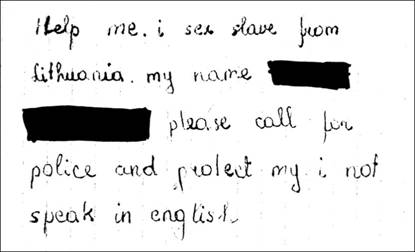
“Help me. I am a sex slave from Lithuania. Please call the police and protect me,” says a note which the Danish newspaper Ekstra Bladet got access to this week. It was a terrible view meeting the Danish police when they found the 19-year old Lithuanian girl in a lapidated Copenhagen apartment this week. The woman stayed in very miserable conditions.
“The kitchen was, in my opinion not suitable for people and there were cockroaches everywhere. Moreover, we found evidence that someone had managed to fit a padlock on the outside of the door into the woman's room,” says Trine Møller Andersen, head of the Copenhagen Police group against women trafficking.
The young Lithuanian woman lived in an inhuman nightmare in which she had been kept as a sex slave.
When she was not serving sex clients, who apparently could not feel the soggy conditions in the 'sex-nest', she lived in a spartan, unhygienic room with only a mattress on the floor and old, dirty bed linens full of cockroaches.
Outside the room the door was mounted a bracket made ready so it could put a padlock on - if the sex slave should get ideas about escaping.
But the woman had still succeeded in sending a cry for help to a friend in Lithuania over the Internet and asked her to contact the Lithuanian police to tell that she was incarcerated against her will.
And after the Copenhagen police on Monday received an official request from the Lithuanian police via Europol, they soon found the woman's 'prison'.
Help me
And it was a depressing sight that met them in the apartment where the woman lived and served men that her pimp brought to her.
The 19-year-old woman began to cry, but when she found out that it was the police, she gave a handwritten note to the female police officer who found her, which in English told that she was kept as a sex slave, that she wanted to contact the police and that she did not speak English. The woman's pimp, a Lithuanian 36-year old man, was also found on the site.
He was arrested and charged with violation of Penal Code provisions on trafficking. He was remanded in custody for four weeks in Copenhagen.
Miserable conditions
“The woman was in physically fine form. She had not been beaten. But she was shocked and scared and very influenced by the situation,” says Trine Møller Andersen, leader of the group against woman trafficking at the Copenhagen Police. She had never seen a similar case, since she started in the group in 2008.
The much older perpetrator had recruited the woman in Lithuania. Here he had got her drunk and had persuaded her to go to Denmark and work as a prostitute with the promise of good earnings as a pawn.
The man then transported her to Denmark and placed her in an apartment in a Copenhagen district, where she also served customers. The perpetrator found the customers, and the woman got only a very small payment. The woman had lived in Denmark for little over a week when the police found her.
The young woman from Lithuania is now at a women’s shelter. She will later return home to Lithuania in accordance with her own wish.
“It's the classic story of these women who do not have the longest school education and who are in desperate need of money, so they can be lured here,” tells Trine Møller Andersen to Ekstrabladet.
20% of Lithuanian victims are underage girls
Lithuania is a source, transit, and destination country for women and children trafficked for the purpose of commercial sexual exploitation. One estimate concluded that approximately 20 percent of Lithuanian trafficking victims are underage girls. Lithuanian women are trafficked within the country and to the United Kingdom, Germany, the Netherlands, Greece, Italy, France, and the Czech Republic for the purpose of forced prostitution. Women from Belarus are trafficked to Lithuania for the same purpose.
- U.S. State Dept Trafficking in Persons Report, June, 2009 [full country report]
- Bookmark :
- Digg
- del.icio.us
- Stumbleupon
- Redit it
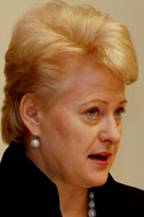 Dalia Grybauskaite, President of the Republic of Lithuania |
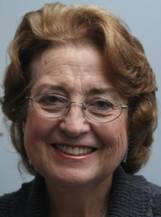 Regina Narusiene, President of the World Lithuanian Community |
REGINA NARUSIENE: “The majority, I believe, are disappointed and discouraged with the present president’s seemingly unfriendly view toward Lithuanian-Americans and others abroad.”
The Baltic Times writes that Lithuanian President Grybauskaite is supposedly “disappointed by Lithuanian emigres’ inability to attract U.S.-based investments to Lithuania.” The newspaper refers to a WikiLeaks document.
According to WikiLeaks, Grybauskaite emphasizes that most prominent U.S. Lithuanian emigres, instead of focusing on developing U.S.- Lithuanian business ties, prefer providing political advice to the Lithuanian authorities, which may not be that necessary nowadays.
In a response to The Baltic Times, Regina Narusiene, President of the World Lithuanian Community, says that “The majority of Lithuanian-Americans are disappointed with Grybauskaite.”
“How do Lithuanian-Americans’ views generally differ on the former U.S.-much-linked President Valdas Adamkus and his successor, Dalia Grybauskaite? Which is favored?,” the newspaper asks Narusiene.
And she answers: “There are different points of view. Some favor President Adamkus, but the majority, I believe, are disappointed and discouraged with the present president’s seemingly unfriendly view toward Lithuanian Americans and others abroad.”
“There is the tendency of some Lithuanian politicians to think that “Lithuania belongs to the Lithuanians.” By that they mean those living in Lithuania only. The people of Lithuania have a more favorable view of Lithuanians living abroad.”
“The Lithuanians abroad have brought many investments to Lithuania. However, I want to emphasize, Lithuania has been having a difficult time setting an investment climate competitive with other countries.”
“Collaboration can have different meanings. Our private ties with the country after independence never diminished, but, in fact, intensified. Economic ties are different. A great deal of money is sent to Lithuania by Lithuanians abroad, especially to their family and friends. I believe an amount equal to about 20 percent of Lithuania’s annual national budget. Some firms have located in Lithuania, but Lithuania has to maintain an inviting environment for investment, which they are developing. Cultural collaboration, however, I admit, has been weak. There is a Lithuanian opera in Chicago that has been collaborating with the Lithuanian National Opera and Ballet Theater. We have participated in the Dance Festivals in Lithuania and sent works of art to Lithuania. Some of the entertainers from Lithuania have come to us to entertain, but working out joint programs has been difficult.”
“Can you think of any cases when Lithuanian emigres cut off their ties with the Motherland because of the lack of the political will to adopt a dual-citizenship law?,” Baltic Times asks.
“There are a number of new emigres who have simply said, “I can do better and live more securely abroad. If they do not want us, then why bother.” Unfortunately, these are well educated young people that Lithuania cannot afford to lose. In several instances, the taking away of Lithuanian citizenship has forced some to keep foreign citizenship so as not to lose their means of support, their pension.”
Ref: http://www.baltictimes.com/news/articles/28875/
* * *
Around half of all Lithuanians in the world live outside their home country. They represent a human resource Lithuania desperately needs to get the country back on its feet again after 50 years of bloody wars, genocides, deportations, Soviet opression and now two decades with much muddle and confusion instead of professional focus on collaboration and team work among its own populations here and abroad.
I suggest that the president now reaches out and invites all Lithuanians, and friends of this country around the world, to a close and constructive cooperation. A continued conflict is truly meaningless and devastating.
Aage Myhre, Editor-in-Chief
Lithuania would benefit significantly by availing itself of the expertise and knowledge found in the Diaspora communities
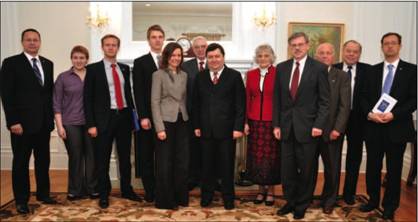
Lithuanian American Council (LAC) Delegation in Conference at Lithuania’s Embassy (LE) in Washington, D.C. with Ambassador Žygimantas Pavilionis, and Emanuelis Zingeris from the Lithuanian Parliament
A delegation representing the Lithuanian American Council (LAC) was recently received at the Lithuanian Embassy in Washington D.C., where it met with the Chairman of the Foreign Affairs Committee of the Lithuania’s Parliament, Emanuelis Zingeris and Lithuania’s Ambassador to the United States, Zygimantas Pavilionis.
In the course of the meeting LAC representatives expressed their concern on a wide range of topics including Lithuania’s developing energy policy, the country’s image in the international community, emigration issues and their demographic impact, the prospect of maintaining citizenship rights of recent immigrants, ongoing cooperation between organizations of the Diaspora and Lithuania, and minority issues in Lithuania. LAC representatives suggested that Lithuania would benefit significantly by availing itself of the expertise and knowledge found in the Diaspora communities in developing energy and security policies and a host of other areas such as environmental issues, ecology, medicine, economic development, and the promotion of improved interactions between the government and the people through non-governmental organizations.
- Bookmark :
- Digg
- del.icio.us
- Stumbleupon
- Redit it
- Posted by - (0) Comment
The World Lithuanian Economic Forum, 4 – 5 July:
A perfect meeting platform for Lithuanians from all over the world

Mindaugas Glodas, General Manager of Microsoft Lithuania:
“The World Lithuanian Economic Forum is a perfect meeting platform for Lithuanian business people from all over the world and for those who are interested in Lithuania as a potential partner. I believe that making personal contacts is the best means to foster international cooperation and successful growth of new businesses. Lithuanian business needs new markets and investment for development of new ideas. This is one more step that has to be taken towards seeking to make Lithuania more important for the world and to making the world more important to Lithuania.”
PROGRAMME: http://www.plef.lt/programa.htm
- Bookmark :
- Digg
- del.icio.us
- Stumbleupon
- Redit it
- Posted by - (1) Comment

This year’s ‘World Lithuanian Economic Forum’ takes place in Vilnius 4 – 5 July
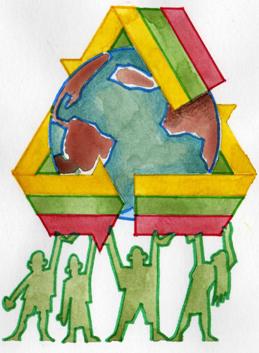
There is over a million of people of Lithuanian origin living outside Lithuania. Having left their motherland in different times and of different reasons they are now living and working in countries around the world. Many of them became successful businessmen: owners or managers of big corporations and companies or highly ranked experts in different fields.
Establishing of a closer relationship with Lithuanians living abroad should nowadays be one of the most important goals in the strategy of our government. The diasporas represent an invaluable source which can enrich Lithuania and help to create a better future of our country.
The goal of the World Lithuanian Economic Forum is to attract Lithuanian business people, economists, politicians and scientists from the entire world into Lithuania’s economic life of today, to strengthen their relations with Lithuania, to encourage them to develop business in our country, to help attract investments, to enterprising growing Lithuanian companies, to create a global network of Lithuanians from all over the world.
The Forum is organized by Lithuanian Business Confederation | ICC Lithuania in cooperation with a number of partners – governmental institutions as well as business companies.
The first Forum, named “Competitive Lithuania: innovative economy, effective business development and investment”, was organized in 2009 in Vilnius. In 2010 WLEF “High tech innovation & investment: local to global” was held in London. Both events got loads of attention from public and media. Following the traditions this year WLEF comes back to Vilnius and will be held 4 – 5 July.
The main theme of his year’s event is the creation of a competitive state. Experts, business people and scientists of different spheres from all over the world will discuss the vision of the world and Lithuania in ten years, the creation of competitiveness through innovations, a partnership between business and science, the encouragement of starting and growing businesses.
For registration and additional information: http://www.plef.lt/
- Bookmark :
- Digg
- del.icio.us
- Stumbleupon
- Redit it
- Posted by - (6) Comment
Would a ‘Genealogy Section’ in VilNews be of interest for you?
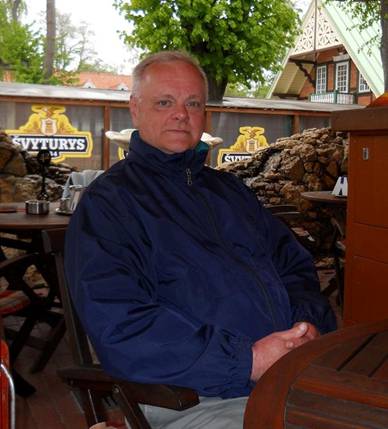
Please contact our Associate Editor, Vin Karnila, as soon as
possible if you think a ‘Genealogy Section’ in VilNews would
be of interest for our readers around the world.
vin.karnila@VilNews.com
Text: Vin Karnila, Associate Editor
We at VilNews have received numerous inquiries from our readers regarding locating relatives in Lithuania or more specific information about their Lithuanian ancestors. Since we know that tracing your Lithuanian Roots is a very important issue for many of you, we are considering a special section, “Genealogy Lithuania”, to assist you in finding information about your ancestors in Lithuania.
Please respond to us if you think such a section would be of interest for our readers around the globe.
The On Line Lithuanian Telephone Book
Once you have an idea as to what the names of your immigrant ancestors were the best place to start and probably the most recommended is the On Line Lithuanian Telephone Book
http://www.zebra.lt/lt/suzinok/telefonai/. This can help you find people currently living in Lithuania with the family name you are searching for. This was in fact how I first found members of the Karnila family so this is what I always first recommend for people to use.
It is however in the Lithuanian language so here are some instructions for using it.
Pavardė = family name/last name
Vietovė = location – In the pull down menu you will see “Didieji miestai”. These are the large cities in Lithuania. “Kiti miestai” are other cities in the country. If you want to search a specific city, click the city of your choice. If you want to search all of Lithuania, do not select a city.
Then click “Ieškoti” and the next page will show any matches to the name you entered.
Some helpful advice for finding a place on a map
The online Lithuanian Telephone Book web site will show you the location on a map however if you want to find the location again on a mapping web site you will need to enter the name correctly. If you try to copy the address that the phone book gave you it will not work. This is because the place names are displayed with Lithuanian grammar.
As an example, the listing could show an address like this:
Sodų g. 2, Rumšiškių mstl., Rumšiškių sen., Kėdainių raj.
The street address, Sodų g. 2 will work on a mapping web site but the rest will not.
“Rumšiškių mstl.” is actually Rumšiškės so you would need to enter Rumšiškės in the mapping web site. The “mstl.” is the abreviation for miestelis which means town. Don‘t enter the word “miestelis” or “mstl” in the mapping web site. You may also find a listing such as “Bajoriškių k”. The “k” means Kaimas or village so this would be the village of Bajoriškiai. A listing such as “Švenčionėlių m.”. The “m” means miestas or city so this would be the city of Švenčionėliai. Don‘t enter the words “village” or “city and don’t enter or “k” or “m” in the mapping web site.
“Rumšiškių sen.” is Rumšiškių seniūnija. Seniūnija is the local government administration office so this means that Rumšiškės is under the jusidiction of this office. You wont need Rumšiškių sen. For the mapping web site. Only enter this if you do not know the name of the village but know what administrative office serves it.
“Kėdainių raj.” is Kadainiai region. Again, you won’t need this for the mapping web site. About the only time you would need to enter the seniūnija or region is if there are more than one town or village with that name.
www.maps.lt is a very good mapping web site you may want to check out.
Even with the number of mapping web sites out there it is a good idea to get a map. The problem with the mapping web sites is that as you zoom in, the area you are viewing gets smaller and you lose the relationship of where you are in relation to other areas. When you zoom out you lose details. When you get a map you will want the scale to be at least 1:400 000. Even at this scale it will not show some of the smaller villages. As an example my family’s village of Garonys is not shown on a map of this scale. To get a map that shows my village I bought what is called an “apylinkės” (district) map which is at a scale of 1:130 000. Another good tool is the Lithuanian Road Atlas in 1:120 000 scale. All of these maps and atlases are available at www.balticvalue.com They have about the largest assortment of Lithuanian maps and road atlases on the Internet.
Some websites
We have compiled a list of some good web sites to get information from. Please keep in mind that no one web site will usually give you all the information you are looking for so it is good to check as many as you can.
Lithuanian Global Genealogical Society. LGGS
http://www.lithuaniangenealogy.org/
GenoPro - Genealogy ressources in Lithuania
Good site with useful links for searching for people of the Jewish Faith.
Included are The JewishGen Yizkor Book, JewishGen ShtetlSeeker, Litvak SIG and JewishGen Lithuania Database
http://www.genopro.com/genealogy-links/?country=LT&t=Lithuania
Lithuanian State Historical Archives
http://www.archyvai.lt/archyvai/index.jsp
Vilnius church provincial archives documents and metadata information system – Lithuanian language
http://www.kf.vu.lt/baris/
Archives of Belarus
http://archives.gov.by/eng/
Polish Virtual Archives
http://szukajwarchiwach.pl/
Polish genealogy and coats of arms
http://www.jurzak.pl/
Polish genealogy
http://www.genealogiapolska.pl/index.php
Lithuanian estates Database. Very interesting web site – Lithuanian language
http://www.heritage.lt/dvarai/ppavadinimas.php
Lithuanian military volunteers - Lithuanian language
http://www.versme.lt/sav_a.htm
The Statue of Liberty- Ellis Island Foundation
http://www.ellisisland.org/
LitvakSIG – Lithuanian Jewish Special Interest Group
http://www.jewishgen.org/litvak/all.htm
Genealogy Links Lithuania
http://www.genealogylinks.net/europe/lithuania/
LITHUANIA MAILING LISTS
http://www.rootsweb.ancestry.com/~jfuller/gen_mail_country-lit.html#LITHUANIA
Lithuania Professional Research
http://genealogyjourney.com/t/?x=Vilnius
Lithuanian Place Name Changes
http://www.rootsweb.ancestry.com/~ilwinneb/placelit.htm
As stated before, no one web site will usually give you all the information you are looking for so dear readers if you know of any web sites that are helpful in providing information for tracing some ones Lithuanian Roots please tell us about them so that we can share them with our fellow readers.
A word about some of the genealogy pay sites. As you search the web for sites that offer genealogical information you will come across many sites that require you to pay a fee to use them. Are they worth it??? Good question. Let’s face it, if they help you find your family they are worth it but the chances of finding your family on one of these sites is kind of hit or miss. This is because of how most of them work. Most of them do two things. They provide a program to organize your data or in other words create your family tree. What they also do is give you access to the data from the other people that use this site. So if some one that has a connection to your family has also paid to use this site then it is possible to view their information – maybe. The person has to authorize the web site to display their information. They can also instruct the web site to limit the information for privacy purposes. I have found that this “limited” information is not much help. Of course if no one with a connection to your family has used the specific pay site then it won’t be of much help to you.
As you start to gather information it is highly advisable to organize it. The best way to do this is to use genealogy software. There are quite a few genealogy software programs out there. I have tried a few and have not been very satisfied with them. The reason being that the reports they generate are limited. There is only one software program that I can personally recommend and I can tell you that I highly recommend this software. It is easy to use, easy to input data and easy to find data and it provides a very wide variety of report formats. The program is called “Brother’s Keeper” and it is considered one of the best genealogy software programs available.
You can get more information from their web site
http://bkwin.org/
at the bottom of the page you will find the link to their online store
http://brotherskeeperstore.stores.yahoo.net/brotkeepforw.html
Contact the people that you possibly are related to
Now let us talk about what you can do once you finally find information about a person or some people that you are possibly related to. There is only one thing to do – You need to contact them. If you have both an Email address and a mailing address I would recommend that you send both an Email and a letter. This is because you don’t know if one or the other is still current.
In the message KEEP IT SHORT AND SIMPLE. Tell them who you are. Tell them the information you know. This would be the information about the people in your family that do not live in Lithuania. If you have information about your family in Lithuania of course include this. What you are trying to provide is a line from you back to Lithuania. The information that is helpful is names, dates and places. Adding brothers, sisters and cousins will not be of much help and could confuse things unless any of these people were born in Lithuania or can trace themselves back to Lithuania.
If you are going to write a letter to Lithuania and don’t speak Lithuanian I really wouldn’t worry about it. In this day and age in Lithuania finding some one to translate a letter written in English is not much of a problem. However when I recommend KEEP IT SHORT AND SIMPLE, you will want to be very careful in regards to grammar and phrases. I am an English language trainer here in Vilnius and I can tell you that only my advanced level students can fully understand (sometimes) all the nuances of English grammar. When you write your letter try to use only the “simple tense” and limit the use of the “continuous tense”. Try to write nothing in the “perfect tense” as the perfect tense is VERY difficult to understand because this form of grammar does not exist in the Lithuanian language. Writing a letter all in the simple tense is easy to do and easy to translate and understand. I also operate an editing service here and I can tell you that most of the letters I edit related to genealogy end up being reduced by about 50% so that only the key information remains - KEEP IT SHORT AND SIMPLE.
The next question is when should I send the letter???
The answer is – As soon as you get a name and address to send a letter to!!!
I have edited some letters more than a year ago for some people and they still have not sent the letter. The usual reason is that they are still trying to get more information. Until you send the letter you probably won’t get any useful information so just send the letter. Some one may respond to your letter in effect saying that your information is too general to show a direct link. If that’s the case, at least you have established a contact. I have found that the people here in Lithuania are more than happy to try to help people find their families even if they are not sure they are directly related to you.
Searching for your roots can be interesting, rewarding and frustrating. So much of it is hit or miss and in some cases just pure luck and good fortune. Although it took years for me to finally find and connect with my family here in Lithuania, I was lucky that the name of Karnila is a rather unique name. All of the Karnilas in Lithuania are traced back to the same family. My grandmother’s family of Petkevičius is a different matter in that it is more common. Eventually I learned that I had to address her family as Petkevičius of the Kaišiadorys region. When I enter the name of Petkevičius in the On Line Lithuanian Telephone Book there are 280 matches. A dear friend of mine has the family name of Kazlauskas. When you enter this name in the On Line Lithuanian Telephone Book you get about 150 matches. Things like this can make matters much more of a challenge. In spite of some of these road blocks and detours the key to success is to just keep on searching.
|
Please let us know if you think a “Genealogy Section” in VilNews would be of interest |
- Bookmark :
- Digg
- del.icio.us
- Stumbleupon
- Redit it
VilNews e-magazine is published in Vilnius, Lithuania. Editor-in-Chief: Mr. Aage Myhre. Inquires to the editors: editor@VilNews.com.
Code of Ethics: See Section 2 – about VilNews. VilNews is not responsible for content on external links/web pages.
HOW TO ADVERTISE IN VILNEWS.
All content is copyrighted © 2011. UAB ‘VilNews’.

 Click on the buttons to open and read each of VilNews' 18 sub-sections
Click on the buttons to open and read each of VilNews' 18 sub-sections 


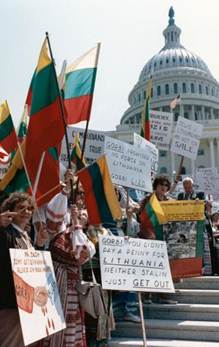

 Valdas Adamkus.
Valdas Adamkus.






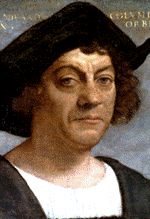
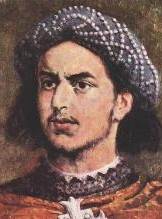



















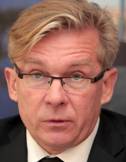



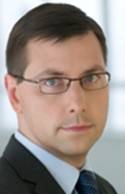
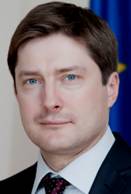
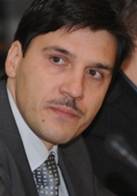
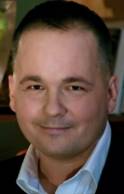
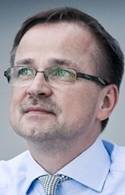
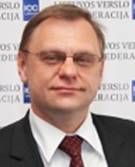
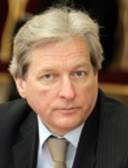
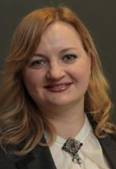









.jpg)



